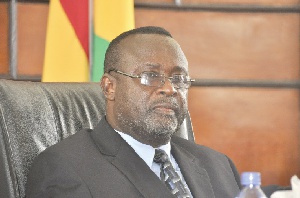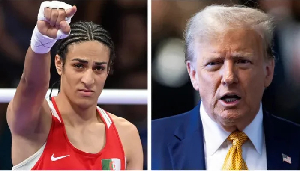“It is my considered opinion that even if any or all the categories of irregularities as identified by the petitioners are upheld, the results ought not be annulled, since the said infractions are not traceable to the millions of people who will be disenfranchised.”
This was contained in the 34-page judgement of Justice Paul Baffoe-Bonnie, one of the judges who dismissed almost all the claims brought by the petitioners in the just-concluded landmark Presidential Election Petition.
He, instead of annulment, rather held that the results should only be cancelled as having been compromised or tainted by administrative lapses.
“In that case, we should not cancel the whole election (including the uncompromised parts), nor should the election be called based only on the remaining untainted votes, as being suggested by the petitioners, but the voters and polling stations whose votes are cancelled as a result of the administrative lapses must be given the second chance to exercise their constitutionally guaranteed right to vote before the final results are declared.”
Right To Vote
He said “the petitioners’ novel legal theory of annulling so-called tainted votes that would permit a segment of the population ie. some 4 million voters, to be disenfranchised finds no place in a democracy built upon principles of inclusiveness, equality, and citizen participation.
“The right to vote and thereby partake in governance and decision making has been fought for by some democrats of old. Some have paid the ultimate price to ensure that no category or class of people are disenfranchised.
“It is not too long ago that the blacks of South Africa were given the right to vote. The same thing applies to USA. In some countries women were given the right to vote not too long ago. We in Ghana have had the universal adult suffrage since independence. Even though some countries prohibit prisoners from voting, in Ghana we don’t.
“This is how far we have come in our quest for democratic governance. We should do everything possible to protect this right. And the least we could do is not to disenfranchise people through technical or administrative lapses over which they have no control. It is my opinion that the basis of the petitioners’ claim, i.e. the declaration of the First petitioner as winner after annulment of some 4 million votes, is completely flawed.”
Absence of signatures of Presiding Officers
He said it was the contention of the petitioners that failure to sign by the presiding officer is an infraction that should lead to the annulment of votes, adding that “this is because according to them, once the signing is mandatory the consequence is that the votes do not become valid without the signature.
“I do not think so. Though the article makes signing mandatory, it does not prescribe any consequences for failure to sign. Looking at the said article critically, the word ‘shall’, as used, goes to show the sequence of events or series of things that have to be done. And here, the sequence is shall sign, shall there then announce the results before forwarding same to the presiding officer.
“The article only uses the word ‘shall’ to denote a series of things to be done and the sequence in which it should be done. Failing to do it the way suggested by the article makes it an irregular performance of duty.”
He said, “It is an irregularity that does not go to the root (of the case). Then the question that has to be asked are (1) has anybody been specifically adversely affected by this irregularity that should lead to an annulment or even cancellation of votes regularly cast?”
Justice Baffoe-Bonnie said that the court’s attention had been drawn to its recent decisions where the court strictly interpreted the word ‘shall’ in Article 181 of the constitution and concluded that failure to secure parliamentary approval for a loan was fatal as provided by the constitution.
“To strictly interpret this article the way the petitioners are seeking to do is to take the importance away from the voter and giving same to the persons who run the elections. If the absence of the single signature of the presiding officer can lead to the annulment of the votes of hundreds of thousands of voters, then the election ceases to be about the voters and shifts to the presiding officer; so that if a presiding officer, either from pressure of work, oversight, or plain mischief fails to sign, then fatally, hundreds of voters are disenfranchised. Again a corrupt politician needs only to team up with a few hundred presiding officers in an opponent’s stronghold, and bingo! fortunes are turned. This will be carrying strict interpretation to absurd limits.”
Justice Baffoe-Bonnie acknowledged an affidavit by a witness for the petitioners that sought to explain the absence of signature on a pink sheet, saying, “This affidavit put in by the witness of the petitioners is self-explanatory. The witness did not sign the pink sheet at the polling station as required and he was later tricked by the representative of the 2nd respondent to sign.
“Ostensibly, this affidavit was put in to show that some pink sheets were not signed at the polling stations and that long after the results had been declared, the 2nd respondent was clandestinely seeking to sign pink sheets.
“It is my considered view and I hold that non-signing by the presiding officer is a mere irregularity that does not go to the root of the matter. It did not affect the conduct of the polls and therefore should not lead to the annulment or even cancellation of votes. The petitioners claim on this ground is dismissed.”
Over-voting
According to Justice Baffoe-Bonnie, all the figures that the petitioners are asking to be annulled in relation to over-voting are verifiable from the face of the pink sheets.
He said the respondents disputed the three-tier definition of over-voting and said the classical definition of over-voting was where the ballot papers actually exceeded the number of persons actually registered at the polling station.
“Even then when it comes to over-voting the pink sheet may not be the primary or only source of information. And that if figures on the pink sheet indicates that the ballot papers found in the box actually exceed the figure written for the number of registered voters, one will have to cross-check from the actual register of the polling station.
“It might well be that the presiding officer might have made a mistake when writing the figure of number of registered voters. Mr Asiedu Nketiah, (who gave evidence) for the 1st and 3rd respondents, denied the possibility of over-voting and said this could be due to the presence of foreign objects in the ballot box which is weeded out at the sorting out stage. In their estimation therefore, there was no over-voting and so this category should also be rejected.
“I do not think the petitioners are describing over-vote as objects found in the ballot box. I cannot see how a foreign object as described by the witness be counted as over-vote. If an aggrieved voter tears off an A4 sheet and writes on it THEY ARE ALL GREEDY BASTARDS, and places same in the ballot box, it is a foreign object. This is not the type of paper that will feature in the petitioners’ over-vote column. My understanding of the petitioners’ over-votes is that it relates to the votes declared for candidates and those rejected for cause. That will be A+B in the last column on the pink sheet against any of the columns already mentioned.”
Accepting Petitioners Definition
“Seen this way, I must say that I agree with the petitioners’ definitions of over-voting. But this expanded description of over-voting is what runs the petitioners into problems and that led to the two often touted mantras; ‘you and I were not there” and “on the face of the pink sheet’.”
Pink Sheet As Primary Record
“I have no doubt at all that the pink sheet is the primary source of information at the polling station. After all, it is the information on the pink sheet that is collated and forms the basis of any or final declaration.
“But I definitely do not agree that other sources may not be referred to for information if any doubt arises. Each polling station has the official register, and each polling agent has the polling station register. So if the question B1 has a blank, answer the correct figure is ascertainable from other sources. There should not be the rush to declare over votes just because on the face of the pink sheets the column shows blank.
“I have noticed that the petitioners have identified some 180 pink sheets where C1=blank or C1=0. The votes tally on that list alone is over 93,000 votes. There were also several pink sheets in this category which clearly on second look did not reflect over-voting.
“While in the (witness) box, Dr Bawumia admitted to several such pink sheets which they had originally selected to contain over-voting, actually did not reflect over-voting upon second look.
“There were some pink sheets on which errors had apparently occurred as a result of carbonation. For example there were some pink sheets on which in the figures column two candidates were said to have received 11, but in the words column it was “one”.
“Aside of these were many errors which may be described as clerical. There were also very many pink sheets which recorded cases of actual over-voting – i.e. where rejected ballots and valid votes put together were more than persons actually verified to vote.
“However, sifting the ones actually affected by over-voting from the many affected by the many clerical errors, one is left with very few pink sheets whose results will not impact positively on the outcome of the overall results. I will therefore dismiss the claim on account of this ground.”
Voting Without Biometric Verification
Tackling the petitioners’ claim on voting without biometric verification, Justice Baffoe-Bonnie said, “The nation spent a lot of time and energy registering eligible voters biometrically,” adding, “There appeared in the political landscape the popular slogan “NO VERIFICATION, NO VOTING.” C.I.75 Reg. 30(2) this slogan.
“Be that as it may, constitutionality or otherwise, all the parties went into the general election with the understanding that no verification, no voting. The whole concept of biometric registration and verification before voting had been introduced as a way of reducing to the barest minimum if not eradicate completely, the incidence of claims of double voting and impersonation that crop up after every election.
“Indeed at one of the numerous press conferences, the electoral commissioner made it clear that at the end of the polls, where the votes cast exceed the number of persons verified to vote by even one vote, the results of the said polling station will be cancelled.
“The petitioners have tendered quite a number of pink sheets on which this question had been answered with figures and even sometimes figures reflecting the total number of voters who cast their ballots in that polling station, indicating that every person voted without being verified by the biometric devise.”
Justice Baffoe-Bonnie said that the respondents agreed that the slogan NVNV was actually coined for the election and was indeed used, adding that they had argued that nobody voted without being verified by the BVD.
“I do not think that the petitioners failed to discharge the burden placed on them. As was said in the beginning, like in any civil action, the petitioner bears the burden of proof.”
He said the onus was therefore on the petitioners to prove that some voters voted without going through the BVD.
“We are told that the BVDs still have embedded in their memories data reflecting the number of voters that were actually verified by each machine. These devices are still in the custody of the 2nd respondent. One would have thought that the memories of the BVDs could have settled this problem. But they never felt it necessary to tender them in evidence.
“In the absence of any credible explanation, it is my opinion that the petitioners have discharged the burden of proof placed on them. In spite of the agreement on the NVNV, and despite Reg. 30(2) of CI 75, some people were allowed to vote without verification. Viewed against the backdrop that some people were actually prevented from voting because they could not be verified, to have allowed voting in some polling stations was discriminatory and should lead to cancellation of their votes.
“I will therefore uphold the petitioners claim on this ground only to the extent that those voters that have their votes cancelled should have the chance to recast their votes lest they be disenfranchised.”
The Order
“I dismiss the petitioners claim to annul votes on account of claim of duplicate serial numbers as frivolous,” he said, adding, “I dismiss the petitioners claim that votes should be declared invalid on account of the non-signing by the presiding officer. To disenfranchise hundreds of thousands of voters (through no fault of theirs) because a presiding fails to sign will not have a place in modern democratic governance.
“I uphold the principle that once over-voting is detected in a polling station the elections there are compromised and should be cancelled but the voters there should be given a second chance to cast their votes.
“However, I find that in view of the admissions made by the 2nd petitioner with regard to some pink sheets and the many clerical errors, I find that the number of pink sheets affected in this category has so reduced that the votes affected are not too significant to make any impact even if they are cancelled. I dismiss the claim on this ground too.
“I hold that the petitioners have discharged the burden of proof on them that voting took place in some polling stations without prior biometric verification. This was discriminatory since other persons had been turned away for their inability to be verified. All those stations affected by this phenomenon should have their votes cancelled and the voters given a second chance to vote again.”
General News of Thursday, 12 September 2013
Source: Daily Guide













